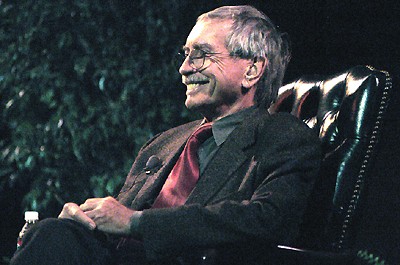
Meadows awards playwright
Edward Albee, the award-winning American dramatist whose 28plays include “Who’s Afraid of Virginia Woolf?,””The Zoo Story” and “The Goat or Who IsSylvia,” will receive the 2003 Algur H. Meadows Award forExcellence in the Arts on Saturday, at the Meadows School of theArts.
Prior to accepting the award, Albee will spend three days oncampus and participate in two public evening events at SMU.
The first, “A Conversation With Edward Albee,” washeld Wednesday night in the Bob Hope Theatre.
Albee’s biographer, Mel Gussow — a cultural affairswriter and former theatre critic for The New York Times —moderated the open forum discussing Albee’s life andcareer.
Very early in the forum, a small debate was raised over criticsreviewing plays.
Albee actually turned the questioning over to Gussow, asking himwhether or not Gussow thought critics should read plays beforereviewing a show, to which he promptly responded with a hearty”No.”
When asked the same question in return, Albee countered,”Yes, of course.”
“Every production is an opinion of the play, not the playas it actually exists on paper,” Albee added.
Throughout the conversation, Albee shared anecdotes about hiscareer as a playwright, involvement with the actors in hisplays’ productions and life in general.
One of the funniest stories involved Albee and actor John Hughgoing back and forth over an 11-minute dialogue Albee wrote into ascene.
Becoming frustrated with the actor’s unwillingness tomemorize the entire speech, the playwright came close to”letting Hugh go.”
“[At the time], I was like, ‘I’m going to downin history — for the playwright who fired John Hugh,’and I thought, ‘WOW!'”
During the rest of the forum, students, along with Gussow, weregiven the opportunity to ask questions.
Interview with Edward Albee
Q: Time is a reoccurring, important thing for you. Why isthat?
A: People seem to want to rush through life. What would be worsethan coming to the end of your life and realizing you didn’tlive it fully or dangerously? People just want to get through life,and that’s one of my concerns.
Q: You tried your hand at writing poetry …
A: I like how you phrased that. It wasn’t as if I satthere writing poetry and nothing happened. I just wasn’t verygood. I got better eventually. I started mimicking betterpoets.
Actually, one literature magazine published two of my poems, andthen it was the last magazine they published. [Laughs]
Q: Do you know the ending of your plays when you write them?
A: I know the destination.
Q: What do you tell people that want to be playwrights?
A: I tell them life is not fair. You go through it, and youdie.
If you happen to be a playwright somewhere in there, great.[Pause.] If you can’t live without it, do it.
Q: What is your motive for writing?
A: My motive? … To get it out of my head.
Q: When you were a boy did you have ambition?
A: No, I was a writer.
Q: Were you ashamed of that?
A: Oh, I’m sorry. I was joking. The only ambitionI’ve ever had was to never have a real job.
Q: Do you have any plays that you’ve been thinking aboutwriting?
A: Well, I always have a play in my head — always. Iusually answer this question by saying one day I’m going towrite a play about Attila the Hun.
Q: You’re still saying that?
A: Yes, I still plan to write it! He was one of the mosteducated people of his time. And also, there weren’t a lot ofreporters around then, so I can make up my facts.








